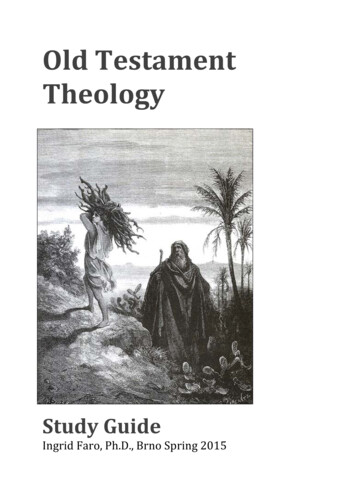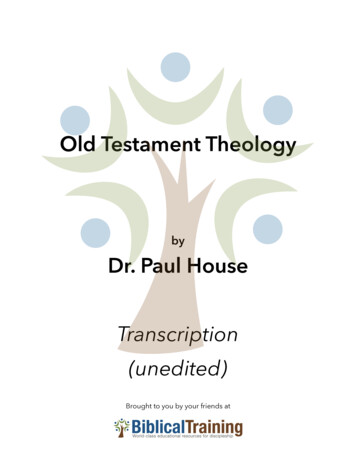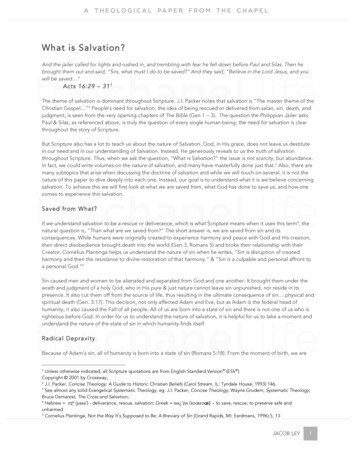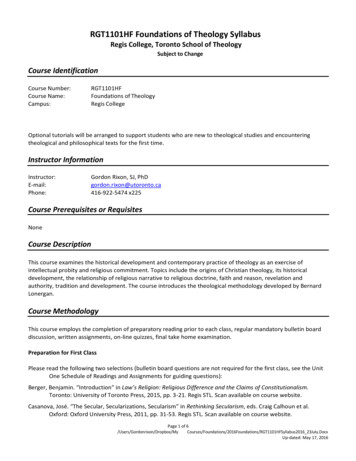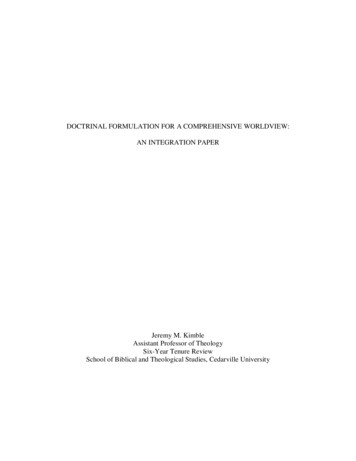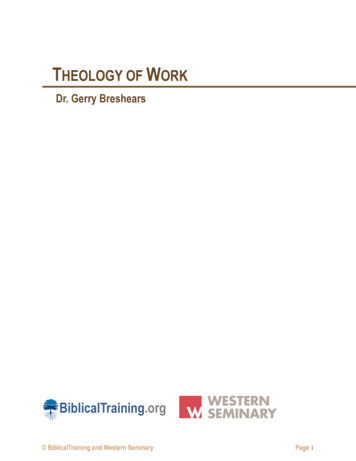
Transcription
THEOLOGY OF WORKDr. Gerry BreshearsBiblicalTraining.org BiblicalTraining and Western SeminaryPage 1
Table of ContentsLesson 1 – Overview3Lesson 2 – Who God Is: Pictures of God5Lesson 3 – The Image of God7Lesson 4 – Humanness9Lesson 5 – Spiritual Gifts11Lesson 6 – Calling/Vocation16Lesson 7 – Salvation: Elements of the Gospel18Lesson 8 – Work22Lesson 9 – Justice24Lesson 10 – Rest26 BiblicalTraining and Western SeminaryPage 2
Theology of WorkDr. Gerry BreshearsSession 1 – Overview1. Every Member a Minister2. Secular vs. Sacred?3. Defining WorkThe biblical doctrine of work is the gracious expression of creative energy of theLord in the service of others to create shalom.Dorothy Sayers via Tim Keller and Gerry Breshears4. A look aheadLesson 2: Who God IsLesson 3: The Image of GodLesson 4: HumannessLesson 5: Spiritual GiftsLesson 6: VocationLesson 7: SalvationLesson 8: WorkLesson 9: JusticeLesson 10: Rest BiblicalTraining and Western SeminaryPage 3
Reflection Questions – Lesson 11. What elements of Gerry’s definition of work are new to you? What do you see as thestrengths of the definition? The problems or weaknesses?2. How do you think your attitude toward your job would change if you saw it as a means ofshowing God’s creativity, serving others, to help society flourish? BiblicalTraining and Western SeminaryPage 4
Lesson 2 – Who God Is: Pictures of God1. The Relational God: God as Unity and Trinity, in CommunityGenesis 1:26-272. The Self-Giving GodJohn 14-163. False Pictures of GodPantheismDeismPolytheismSemi-Deism4. God as Co-workerGenesis 2: 15-255. God as dying MessiahGenesis 3:1-246. God as Covenant PartnerIsaiah 6:1-13 BiblicalTraining and Western SeminaryPage 5
Reflection Questions – Lesson 21. Which picture of God that Gerry showed is most meaningful to you? Why?2. Is the view of God as a relational, self-giving God a new concept for you? How might thisview impact your spiritual life? The way you do ministry? BiblicalTraining and Western SeminaryPage 6
Lesson 3 – The Image of God1. The meaning of ‘image’ – making something visible or presentGenesis 1:26-27Daniel 32. Jesus as the image of GodColossians 1:15John 1:183. Humans as the image of image of GodGenesis 2:7Genesis 1:26-284. The image of God after the fallGenesis 9:3-65. Teleological aspect: The image is designed to grow2 Corinthians 3:186. A definition of image of God: The amazing ability and awesome responsibility to makevisible the invisible characteristics of our Creator and Redeemer.7. Implications of the image of Goda. Protecting lifeb. Attitudes in work8. Review: Dimensions of the image of Goda.b.c.d.Personal: self-awareness, moral decision-makingFunctional: working for and with GodRelational: connecting to humans and GodTeleological: growth and development BiblicalTraining and Western SeminaryPage 7
Reflection Questions – Lesson 31. What are some concrete ways you’ve seen others (or have you) made visible the invisiblecharacteristics of God? What does it cost to do this?2. Of the four dimensions of the image of God that Gerry listed (personal, functional,relational, teleological), which one is the most challenging for you to practice? What changescould you make to make progress in that area? BiblicalTraining and Western SeminaryPage 8
Lesson 4 – Humanness1. What makes humans different from the rest of creation?2. Eight dimensions of humanness:a. Spiritualb. Intellectual/Rationalc. Emotionald. Physicale. Volitionalf. Vocationalg. Familialh. Social BiblicalTraining and Western SeminaryPage 9
Reflection Questions – Lesson 41. Gerry states that it’s important to know these 8 dimensions of yourself in order to knowwho you are as a person, in partnership with God, so you can work with satisfaction withHim and for Him. Which of these dimensions are most challenging for you to bring intobalance in your work? Why?2. Choose one (or more) of these dimensions; what suggestions do you have for others whomay be struggling with this dimension? BiblicalTraining and Western SeminaryPage 10
Lesson 5 – Spiritual Gifts1. Identifying spiritual giftsa. 1 Corinthians 12b. Romans 12c. 1 Peter 4d. Ephesians 42. The relationship between abilities and gifts3. Finding your spiritual gift4. The gift of prophecy1 Corinthians 14:1, 24 BiblicalTraining and Western SeminaryPage 11
Spiritual Gifts – Position PaperGerry Breshears, PhDWestern Seminary, PortlandA spiritual gift is any Spirit spirit-empowered ability that is used in any ministry of the church. AsJesus-Followers we must not be ignorant about our gifts but to use them to worship God, serve Hispeople and fulfill our mission of making disciples of all nations (1 Cor. 12:1-11). Spiritual gifts arebestowed by God through the empowerment of His Spirit and must be exercised in love byfollowing biblical principles and guidelines (1 Cor. 13-14). They are all connected to the fruit of theSpirit (Gal. 5:21-22). Everyone has at least one gift and most Jesus-Followers have several. Noperson has all the gifts and gifts are given by the Holy Spirit, not earned. While there are manydifferent kinds of gifts ranging from quite supernatural (working of miracles) to quite natural(administration) all are Spirit empowered abilities and continue the mission of Jesus. The commondifferentiation between spiritual gifts and natural talents is usually over drawn. Some examples ofspiritual gifts can be found in 1 Cor. 12:8-11, Romans 12:6-8, Ephesians 4:11, 1 Peter 4:9-11.Definitions of Gifts Listed in 1 Cor. 12:8-11:Word of wisdom: The Spirit empowered ability to take the principles of God’s word and practicallyapply them to everyday life situations.Word of knowledge: The Spirit empowered ability to research, remember and make effective use ofinformation on a many different subjects.Faith: The Spirit empowered ability to trust and act on God’s revelation or character, especially whenit empowers others to do the same. The gift of faith is an expectancy, conviction, certainty andassurance that God will act in an evident way to change circumstances or conditions in response to aneed e.g. unusual finances, special provision, divine healing, needed breakthrough, divine protection,deliverance from demonic power, etc.Healing: The Spirit empowered ability to reverse the destructive impact of sin through physical,emotional, or spiritual healing to bring both comfort and health to those who are suffering. It is agift many Christian physicians and counselors exercise in the course of their working.Miracles: The Spirit empowered ability to call upon God to do supernatural acts that reveal Hispower.However that working may not be of the LORD, so we must test the gifts. Satan is a greatcounterfeiter. Matt. 24:24a.Does it promote Jesus as God in the flesh? 1 John 4:1-4b.Does it follow scriptural principles? Deut. 13:1-5c.Does it encourage submission or rebellion? 1 Pet. 4:10-11d.Does it edify? 1 Cor. 12:7e.Is it exercised lovingly? 1 Cor. 13Prophecy: The Spirit empowered proclamation of the Word of God that presses deep into the heartsof people, enabling them to see their lives and circumstances in light of God’s promises, prioritiesand purposes. The message may be directly from God or from Scripture. It is usually God's BiblicalTraining and Western SeminaryPage 12
perspective on present events or persons but may also predict the future. In any case, it is God'smessage proclaimed in the power of the Spirit.We must test any revelation or prophecy (1 Thess. 5:21; 1 John 4:1):a.Are the speaker and the message loyal to the LORD? Deut. 13:1-11; 18:20b.Is it consistent with Scripture? Deut. 13:1-11; 1 Kings 13:15-18c.Is what they describe or predict accurate? Deut. 18:22d.Is their character Christ-like Jer. 23:9-40; Micah 3:5-10e.Does their word lead to up-building and encouragement? 1 Cor. 14:3f.Do the elders affirm their word? 1 Cor. 14:29Distinguishing between spirits: The Spirit empowered ability to recognize whether people, events, orbeliefs are from Satan or God, to distinguish truth from error.Speaking in Tongues: The Spirit empowered ability to praise God or pray to God in languagesunknown to the user. Tongues are spoken to God and prophecy is spoken to people (1 Cor. 14:2-3).Interpreting Tongues: The Spirit empowered ability to interpret languages unknown to the user.Some Common Questions:When do we get gifts?It could be any time, including birth, conversion, as we mature, or for special needs.How many gifts are there?The biblical gift lists contain approximately 20 different gifts. The scriptural lists areexemplary rather than extensive, so there are many gifts not specifically listed in Scripture.The variety in the gift lists gives indication of the diverse workings which the Spirit does inthe people of God to continue the mission of Jesus.Has the Spirit stopped giving some of the gifts?They are all still active as the Spirit wills to give them. The Bible is complete and our onlyinerrant, trustworthy authority. Prophecy and revelation continue and must be testedcarefully. It is not love or gifts, but love expressed in gifts.How do you discover your gift?Ask yourself “What am I good at?” “What am I passionate about?” “What do othersconfirm in me?” Remember that most gifts are not listed in Scripture so don’t limit yoursearch to those lists. Most spiritual gift inventories are misleading at best since they are builton a specific list of gifts.When does a natural talent become a spiritual gift?When ability is Spirit empowered and used for accomplishing the mission of the Jesus.Are any gifts to be sought?We can ask freely, but it is the Spirit who decides and distributes. BiblicalTraining and Western SeminaryPage 13
Are any gifts for all people?Yes. In 1 Cor. 14:1 Paul exhorts all to prophesy that is to speak God’s Word withtransforming power.What does Paul mean by “greater gifts (1 Cor. 12:31; 14:5)?”They are gifts that edify the church more and bring more benefit to others. That some giftsare greater does not mean others are unimportant or that those having greater gifts are betterChristians.What about speaking in tongues?Tongues are for praising God and for prayer (1 Cor. 14). For instance, in Acts 2:11 the 120disciples speak in tongues and declare the wonders of God. That is praise. Others hear thepraise in their own languages and wonder what’s going on, accusing them of being drunk.Peter explains this in his evangelistic Pentecost sermon. (Acts 2:14-21). Paul specificallysays one who speaks in a tongue (language) speaks to God, not other people. (1 Cor. 14:2)Verse 16 says tongues are praising God. Verse 14 and 15 speak of praying in a tongue(language). Paul clearly thinks tongues are good: In verse 18, he says he speaks in tonguesmore than all of them. The abuse in Corinth was that they were claiming speaking intongues as a mark of superior spirituality. They were indulging in uncontrolled publictongues thinking that flaunting their gift was a sign of God’s blessing on them. Unbelieverswho experienced the chaos saw it as a sign that they were out of their mind (1 Cor. 14:23).Paul’s basic point about tongues in the gathering of the church is don’t forbid it (1 Cor.14:39) but to exercise the gift using biblical guidelines.What are biblical guidelines for speaking in tongues in a church assembly?1 Cor. 14:26-28, 39-40 establishes clear guidelines for speaking in tongues. Paul asserts thatonly two or three should speak and one at a time (v.27), there must be interpretation or thespeaker should refrain from speaking out loud (v.28) and there must be control, notconfusion (v.33, 40). BiblicalTraining and Western SeminaryPage 14
Reflection Questions – Lesson 51. Do you agree that the difference between abilities and spiritual gifts is the Holy Spiritempowering that ability? How might this understanding change the way we teach andpractice spiritual gifts?2. Gerry defines prophecy as the Spirit-enabled ability to speak out the Word of God so that itpenetrates deeply in the lives of people. Do you agree that all believers have this gift, orshould seek it? What steps can the church be taking to help this process? BiblicalTraining and Western SeminaryPage 15
Lesson 6 – Calling/Vocation1. Types of Calling:a. Called to be believersRomans 1b. Called to be like Christ2 Corinthians 2:142. Finding my Calling BiblicalTraining and Western SeminaryPage 16
Reflection Questions – Lesson 61. How does Gerry’s view of calling differ from what you’ve been taught before? What do yousee as the strengths and weaknesses of this approach?2. How might our work and ministry be different if we saw our calling in terms of being(becoming more Christ-like) than in terms of doing (involvement in a specific role orministry)? BiblicalTraining and Western SeminaryPage 17
Lesson 7 – Salvation: Elements of the Gospel1. What God doesActs 2:22Jesus is EmmanuelActs 2:23Jesus was crucifiedActs 2:24-32Jesus was raised from the deadActs 2:23Jesus was exaltedActs 2:34Jesus has poured out the Holy Spirit2. How we respondActs 2:37ConvictedActs 2:38Repent (Acts 26:20, Matthew 3:8)Acts 2:41TrustActs 2:41Be Baptized3. What the results are:Acts 2:38Forgiveness of sinsActs 2:38Gift of Holy Spirit: New lifeActs 2:46Hew CommunityActs 2:47New MissionNew Hope: Heaven BiblicalTraining and Western SeminaryPage 18
The Spirit-Empowered Gospel (Acts 2)Adapted slightly from chapter 1, Mark Driscoll and Gerry Breshears, Vintage Church, Crossway, 2009.Acts 2 is widely appreciated by Christians across varying denominational traditions and theologicalpersuasions as the record of the dawning of the New Covenant Church. Jesus poured out his Spiritto begin and to commission the church—the community of Holy Spirit regenerated and empoweredpeople who continue the ministry of Jesus.Some people ask, “What is the gospel?” and then proceed with their own speculations, as ifGod never revealed it to us. A better answer is to read the Bible! There we find Peter’s sermon inActs 2, which summarizes the gospel, the power center of the mission of the church. The gospelpattern of Acts 2, as well as of other Scriptures, breaks down into three aspects: (1) Revelation, orwhat God did; (2) Response, or what we do; and (3) Results, or what God gives.1Revelation: What God DidPeter begins by affirming that Jesus fulfills the promises of a divine Messiah, God come among usas accredited him by miracles, signs, and wonders (v. 22). Next, Peter declares that Jesus died on thecross according to God’s prophetic purpose (v. 23). Peter proceeds to emphasize the reality that Godraised Jesus from death in fulfillment of Old Testament prophecy (vv. 24–32). Peter concludes withthe two final acts of God exalting Jesus to the right hand of the Father in triumph over the spiritualpowers and pouring out the Spirit in fulfillment of Old Testament prophecy (vv. 33–35).Response: What We DoThe first thing we are to do in response to God’s revelation is realize our need for salvation, crying“what shall we do?” That leads us to repent (vv. 36–37). Repentance is the Spirit-empoweredacknowledgement of sin that results in a change of mind about who/what is God in my life, what isimportant, and what is good and bad. This is followed by a change of behavior flowing out of aninternal change of values. The second response is to accept the revealed message about Jesus bySpirit-empowered faith (v. 41). Faith means taking God at his word and trusting my life and eternityto the truth of his revelation. All of this is seen in the act of baptism which is the visible expressionof our connection with the death and resurrection of Jesus through repentance and faith (vv. 38,41).Results: What God GivesPeter immediately announces the gift of forgiveness of our sins, which is the result of thepropitiatory death of Jesus (v. 38). This gift flows into justification, or the imputed righteousness ofJesus. Peter goes on to the second gift, the Holy Spirit and the new heart and new life of Christ (v.38). This is regeneration, or the imparted righteousness of Jesus, is for living a new life as a Christianwith, like, for, to, and by the living Jesus. The third gift is membership in the body of Christ, the newcommunity of the Spirit called the church. This community is a supernatural community whereGod’s power is seen from miracles and supernatural signs to the sharing of possessions among thecommunity members and giving to all in need (vv. 41–47).These three organizational points are adapted from Steve Walker, pastor of Redeemer’s Fellowship, Roseburg,OR. The same basic outline can be seen in Luke 24:46–47; Acts 10:39–43; 13:26–39; Romans 4:22–25; and 1 Corinthians15:1–8.1 BiblicalTraining and Western SeminaryPage 19
This full and robust biblical understanding of the gospel is incredibly important. There aremany truncations of the gospel in today’s church. Some overemphasize the missional aspect of thechurch and in so doing abandon the theological truth that Jesus is God who came in the flesh to dieand propitiate the just wrath of God toward sin. Others overemphasize the experiential aspect ofthe church and focus almost exclusively on renewal and worship while neglecting God’s missionalcalling for the church to be incarnational like Jesus and actively involved in their community and itsculture. Perhaps the most common overemphasis is the confessional reduction of the gospel toJesus’ death, forgiveness of sin, and imputed righteousness leading to eternal life in heaven. Whilethis is true, it neglects Jesus’ exemplary life, resurrection, imparted life of regeneration, and the richlife of the missional community of the church on the earth until we see him face to face.Tragically, many Christians have lost the understanding of the new life of the Spirit. They donot preach or live the regeneration of believers. Rather than living out a joy-filled life flowing fromtheir deepest desire to be like Jesus, they settle for being sinners saved by grace, obligated to do allthey can to keep the law of God by duty rather than delight. Subsequently, they have lost the doublegift of imputed righteousness, which accompanies our justification, and the imparted righteousnessof the indwelling Spirit, which accompanies our new heart and regeneration. On the cross God did awork for us by saving us through the death of Jesus in our place for our sins. At Pentecost we thensee that God does a work in us through the Holy Spirit in our hearts for our regeneration. Together,both our eternity and every step along the way can be filled with hope, joy, purpose, and passion ifwe see the relationship between the cross and Pentecost.God promised a new covenant when Messiah came: “I will give you a new heart, and a newspirit I will put within you. And I will remove the heart of stone from your flesh and give you aheart of flesh. And I will put my Spirit within you, and cause you to walk in my statutes and becareful to obey my rules.”2 In the Bible, “heart” does not usually refer to the physical organ butrather the metaphorical center, seat, and sum of who we are. Proverbs 4:23 says, “Keep your heartwith all vigilance, for from it flow the springs of life.” Therefore, if our life is a river, it flows fromthe wellspring of our heart. The regenerating work of the Holy Spirit in the heart as the source ofthe Christian life and Christian church;People who are regenerated are repeatedly spoken of throughout the New Testament as newpeople with a new identity, new mind, new desires, new emotions, new power, new hope, new joy,new love, new passion, and new freedom to live a new life. Therefore, by the Spirit’s power and ourheart’s desire, we live for, like, through, by, and with Jesus Christ for God’s glory and our joy. We liveour as missionaries for Jesus in the world by loving our neighbors. We also gather together as thechurch to grow together in love for our spiritual brothers and sisters, all of which is done out oflove for God because he has loved us so well.2Ezek. 36:26–27. BiblicalTraining and Western SeminaryPage 20
Reflection Questions – Lesson 71. Which aspects of the gospel, as Gerry has outlined it, are often overlooked in ourpresentations of salvation? What might be the impact if they were included?2. What are the differences between justification and sanctification? How can those differencesbe communicated and exampled to unbelievers and believers in a way that is clear? BiblicalTraining and Western SeminaryPage 21
Lesson 8 – Work1. Created to be Co-workers with GodAdam and Eve: Work in Genesis 1-22. Work and RetirementCommon definition of work: What you do to earn money, so you can do what you wantto do.3. The Purpose of WorkThe gracious expression of the creative energy of the Lord, in the service of others,to create shalom1 Thessalonians 4:9-114. Working with God1 Samuel 16: The Battle is the Lord’sThe Lord’s Prayer5. Work as a Spiritual Discipline6. The Purpose of BusinessBusiness exists in society in order to provide a platform where people can expressaspects of their God given identity through meaningful and creative work and toprovide goods and services to a community to enable it to flourish.Jeff VanDuzer BiblicalTraining and Western SeminaryPage 22
Reflections Questions – Lesson 81. What brings you most satisfaction in work? How does this fit into Gerry’s definition of thepurpose of work? Are there changes needed in how you approach work?2. How might seeing your business as a means of serving others change the way you dobusiness? Which of those changes can you make this year? BiblicalTraining and Western SeminaryPage 23
Lesson 9 – Justice1. What is justice and righteousness?Romans 132. Jesus’ view of justiceMatthew 5: 17-20Matthew 6:1-23. God and justiceDeuteronomy 10: 17-18Psalm 146:74. Faithfulness aspects of justiceEzekiel 18:5-95. Disadvantaging ourselves for justice6. Justice and Shalom7. Injustice“Keeping my stuff to myself for my own comfort” Micah 6:1-8 BiblicalTraining and Western SeminaryPage 24
Reflections Questions – Lesson 91. Bruce Waltke says that doing justice is inconveniencing myself for the sake of thecommunity. Would you add (or subtract?) anything from this definition? What impactmight it have on the church and community if we applied this definition in our lives?2. What is the most personally challenging concept in Gerry’s discussion of justice? Whatwould it take to put this concept into practice? BiblicalTraining and Western SeminaryPage 25
Lesson 10 – Rest1. Does rest mean nothing?Colossians 2:17Matthew 11: 28 – 30Matthew 12: 1-82. Three types of rest: Hebrews 4, 6a. Entering into God’s promised landb. God’s satisfaction in accomplishmentc. Our rest by trusting God3. Ordering my life according to the Divine Ordering4. What rest looks likeRight relationship with God:TrustOrdering my lifeCelebrating in the rhythms of life BiblicalTraining and Western SeminaryPage 26
Reflections Questions – Lesson 101. Do you agree with Gerry that letting work become our identity is a way of hiding from Himand others? What steps can we take to avoid or fix this?2. Who is setting the rhythm of your life? How do we better allow God to do that? What doesit look like when He controls those rhythms? BiblicalTraining and Western SeminaryPage 27
Theology of Work Dr. Gerry Breshears 1. Every Member a Minister 2. Secular vs. Sacred? 3. Defining Work The biblical doctrine of work is the gracious expression of creative energy of the Lord in the service of others to create shalom. Dorothy Sayers via Tim Keller and Gerry Breshears 4. A l

